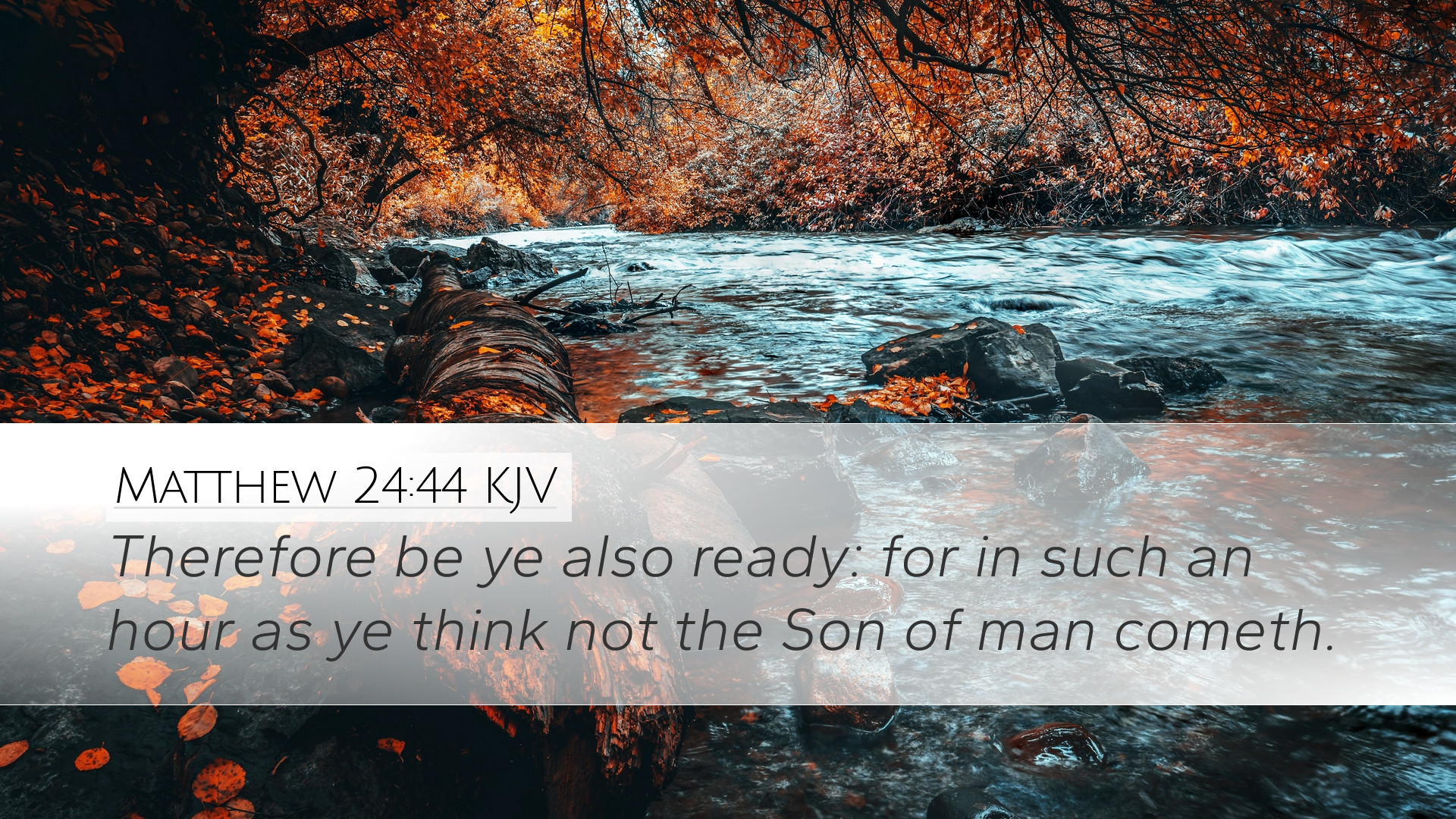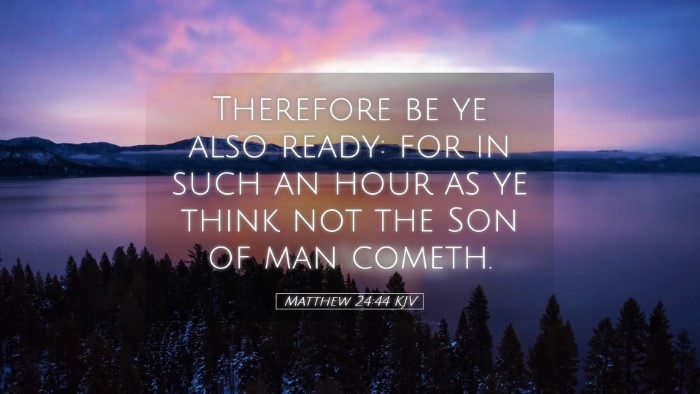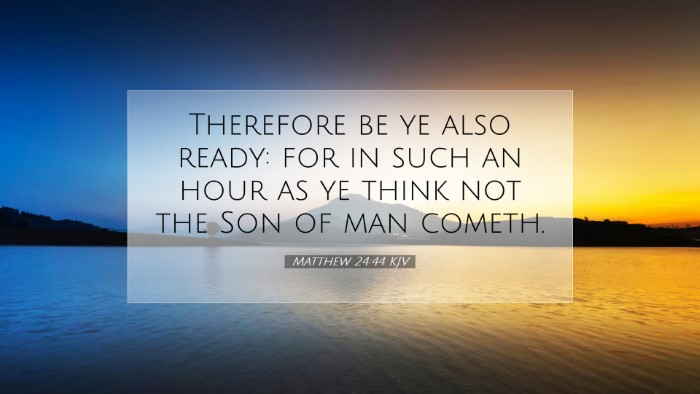Commentary on Matthew 24:44
Bible Verse: "Therefore be ye also ready: for in such an hour as ye think not the Son of man cometh." - Matthew 24:44
Introduction
The teaching in Matthew 24:44 is a profound call to readiness. It encapsulates the overarching message of vigilance and preparedness for the return of Christ. In this commentary, we will explore various insights from public domain commentaries, particularly from Matthew Henry, Albert Barnes, and Adam Clarke, to elaborate on the depth of meaning contained in this verse.
Exegesis of Matthew 24:44
Matthew 24 is part of the Olivet Discourse, where Jesus speaks about the end times and the signs preceding His return. Verse 44 serves as a culmination of the preceding warnings and encouragements.
- Contextual Background: Jesus speaks about the unpredictability of His return, emphasizing that believers must remain in a state of readiness because the timing of His coming is unknown.
- The Call to Readiness: The phrase "be ye also ready" indicates an active preparation, which underscores the importance of a life lived in expectation and obedience to God.
Insights from Matthew Henry
Matthew Henry approaches this verse with a pastoral heart, highlighting several key themes:
- Nature of Christ’s Return: Henry asserts that the unexpected nature of Christ's coming should motivate believers to be ever watchful.
- Spiritual Readiness: He emphasizes that readiness involves not only belief but also a life that conforms to the teachings of Christ. This includes repentance, holiness, and dedication to God’s work.
- The Element of Surprise: Jesus states that He will come at a time when we least expect it, which should ignite a sense of urgency in our spiritual lives.
Insights from Albert Barnes
Albert Barnes offers a theological and practical perspective on this verse:
- The Importance of Vigilance: Barnes reiterates that the believer must always be in a state of alertness, likening this to a servant waiting for their master’s return.
- Practical Applications: He suggests practical applications of this readiness, including prayer, study of Scripture, and engagement in good works, thereby living out faith actively.
- Hope and Assurance: Barnes emphasizes that readiness is tied to the assurance of hope. Knowing that Christ could return at any moment should engender joy and anticipation, rather than fear.
Insights from Adam Clarke
Adam Clarke delves into the linguistic and theological implications of the text:
- Linguistic Analysis: Clarke emphasizes the phrase "as ye think not," elucidating that this reminds us of our human inclinations to become complacent and underscores our need for divine vigilance.
- The Role of Faithfulness: He further notes that faithfulness in our daily responsibilities is intertwined with our preparation for Christ's return. This is not merely a spiritual exercise but a holistic lifestyle.
- The Ethical Implications: Clarke also points out that the anticipation of Christ’s return should propel believers not only towards personal sanctity but also towards the ethical treatment of others, including compassion and service.
Theological Implications
The theological weight of Matthew 24:44 lies in its eschatological implications. Here are some key points to consider:
- The Sovereignty of God: This verse reinforces the sovereignty of God over time and human affairs. It illustrates that God's plans will unfold according to His divine timing, independent of human expectations.
- Christian Eschatology: Understanding this verse enhances one’s grasp of Christian eschatology, emphasizing that while the future is uncertain, believers are called to live in light of eternity. This includes living out the Great Commission with urgency.
- Hope and Encouragement: The promise of Christ's return is a source of hope for believers. This passage encourages Christians to maintain a hopeful outlook, knowing that their faith will culminate in the fulfillment of God's promises.
Practical Applications for Believers
In light of the insights gathered, we present practical applications for pastors, students, theologians, and Bible scholars:
- Encouragement of Active Faith: Encourage congregations and students to engage in active faith practices, such as personal evangelism and service to others, as an expression of readiness.
- Teaching on Eschatology: Equip the church with teachings on Christian eschatology to foster an understanding of the ‘already but not yet’ tension of Kingdom living.
- Personal Reflection: Encourage individual believers to reflect on their own lives and consider whether they are living in a state of readiness—spiritually, relationally, and practically.
- Communal Vigilance: Foster a sense of communal vigilance in the church as they encourage one another to remain faithful and engaged as they await Christ's return.
Conclusion
Matthew 24:44 serves as a poignant reminder of the urgency and importance of being prepared for Christ's imminent return. Through the collective insights of Matthew Henry, Albert Barnes, and Adam Clarke, we are encouraged to embrace this call to readiness both spiritually and practically. As we live in anticipation of Christ’s return, may we cultivate lives that reflect His glory and witness to others, embodying the hope we have in Him.


